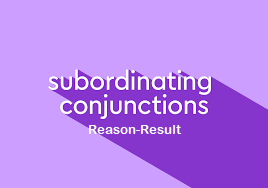News & Events
Subordinating Conjunctions (Reason-Result)
- 2 July 2023
- Posted by: admin-rashtielts
- Category: Grammar

Subordinating Conjunctions
(Reason-Result)
What is a subordinating conjunction?
A subordinating conjunction is a word or phrase that links a dependent clause to an independent clause. This word or phrase indicates that a clause has informative value to add to the sentence’s main idea, signalling a cause-and-effect relationship or a shift in time and place between the two clauses.
Because, as, since, now that, due to and because of are commonly used to connect causes/reasons and results. We also use so, so that, so as, in order to and in order that to talk about purposes or goals. So and so that are more common than so as and in order that. So as is rather informal. In order that is more formal than the others.
- Are you angry with me because I opened the letter?
- He decided to go to the conference in Barcelona, as he was in Spain anyway.
- Jackson coaches his team by telephone, since half of them play in Italy, France or Spain.
- I don’t buy the paper every morning any more now (that) our local shop has closed.
- Due to the heavy rain, the game was cancelled.
- I couldn’t sleep because of the noise.
- Our local shop has closed so I don’t buy the paper every morning any more.
- I asked him to move in order that I could see the screen better.
1. because, because of, due to
Because is more common than as and since, both in writing and speaking. When we use because, we are focusing on the reason:
She spoke quietly because she didn’t want Catherine to hear.
- Warning:
We don’t use a because-clause on its own in formal writing:
In 1998, the government introduced a new import tax because people were importing cars from abroad.
Because of and due to also express the reason for something. They are usually followed by a noun, a gerund, or the fact that + clause. Due to and owing to are more formal than because of.
The plane was late because of the fog.
Flight 341 has been delayed due to adverse weather conditions.
2. as and since
We often use as and since when we want to focus more on the result than the reason.
As and since are more formal than because.
[result] I hope they’ve decided to come as [reason] I wanted to hear about their India trip.
[result] They’re rather expensive since [reason] they’re quite hard to find
- We use because, not as or since, in questions where the speaker proposes a reason:
Are you feeling unwell because you ate too much?
3. to, in order to, so as to
To, in order to, and so as to introduce a clause of purpose and are all followed by an infinitive. To is the most informal.
I took a language course to / in order to / so as to improve my English.
- For negative purpose we use so as not to or in order not to.
She closed the door quietly so as not to / in order not to wake the baby.
- You can also use so (that) + can/could + verb or will/would + verb to express purpose. You can leave out that in informal
They moved to Quito so (that) they could see their grandchildren more often.
Using a comma with subordinating conjunctions:
We often use as and since clauses at the beginning of the sentence. We use a comma after the as- or since- clause:
As everyone already knows each other, there’s no need for introductions. We’ll get straight into the business of the meeting.
Since everything can be done from home with computers and telephones, there’s no need to dress up for work anymore.
- Also when we use because of-clause and due to at the beginning of the sentence, we need a comma:
Due to the heavy rain, the university is closed.
- In many sentences, if there is no comma before as, then as means “in the way that” or “while.” When you insert a comma before as, its meaning changes to “because.”
George cleaned the house as his wife had asked him to.
George cleaned the house, as his wife had asked him to.
Both of these examples are grammatical. However, they do not mean the same thing, and so it is important to know how the use of a comma changes the meaning of the sentence. So, the first sentence above, which contains no comma, can be rephrased as “George cleaned the house in the way that his wife had asked him to.” The second sentence, which contains a comma, can be rephrased as “George cleaned the house because his wife had asked him to.”
- When since is used to replace the subordinating conjunction because, you MIGHT want to consider comma use.
- Place a comma before since ONLY if the preceding clause is negated by the subordinate clause. To help you remember this rule, check to see if the preceding clause contains a negative verb. If it does, use a comma.
She did not apply to her top university pick, since the tuition was way out of her price range.
He was not able to watch his television show, since he lied to his mom about chores.
- If the preceding clause does not negate the new clause, DO NOT add a comma. For example:
I stopped to pick up coffee since I ran out of fresh beans at home.
I was late to work since there was a huge line.
Javidan Language Centre
www.rashtielts.ir
